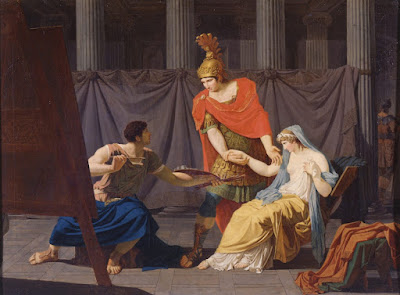 |
| Vincenzo Valdrè Sleeping Silenus garlanded by Bacchantes 1765 oil on canvas Galleria Nazionale di Parma |
 |
| Giovanni Battista Baguti Dejanira pouring the Potion onto the Cloak for Hercules 1768 oil on canvas Galleria Nazionale di Parma |
 |
| Paolo Dardani River Tiber sending Aeneas a Dream of Rome's Future Greatness (scene from the Aeneid) 1775 oil on canvas Galleria Nazionale di Parma |
-1778-oil-on-canvas-Galleria-Nazionale-di-Parma.jpg) |
| Vincenzo Guarana Death of Pallas at the hands of Turnus (scene from the Aeneid) 1778 oil on canvas Galleria Nazionale di Parma |
-1779-oil-on-canvas-Galleria-Nazionale-di-Parma.jpg) |
| Paolo Gallinoni Ascanius wounds Sylvia's Doe (scene from the Aeneid) 1779 oil on canvas Galleria Nazionale di Parma |
 |
| Biagio Manfredi Farewell of Anchises to his son Aeneas and the Delphic Sibyl at the Gates to the Underworld (scene from the Aeneid) ca. 1780 oil on canvas Galleria Nazionale di Parma |
 |
| Gaspare Landi Ulysses and Diomedes stealing the Palladium (scene from the Iliad) 1783 oil on canvas Galleria Nazionale di Parma |
 |
| Pierre Rogat Alexander the Great presenting his mistress Campaspe to the painter Apelles 1787 oil on canvas Galleria Nazionale di Parma |
 |
| Antonio Corsi Daedalus and Icarus 1790 oil on canvas Galleria Nazionale di Parma |
 |
| Giuseppe Paoletti Death of Socrates 1791 oil on canvas Galleria Nazionale di Parma |
 |
| Vincenzo Ferreri Sacrifice of Polyxena 1793 oil on canvas Galleria Nazionale di Parma |
 |
| Giuseppe Fornaroli Ulysses recognizing Achilles among the Daughters of Lycomedes 1795 oil on canvas Galleria Nazionale di Parma |
 |
| Maria Callani Hebe serving Jupiter in the shape of an Eagle 1803 oil on canvas Galleria Nazionale di Parma |
 |
| Luigi Tagliana Departure of Ovid, exiled by Augustus 1821 oil on canvas Galleria Nazionale di Parma |
 |
| Enrico Bandini The Slaying of Pompey the Great 1836 oil on canvas Galleria Nazionale di Parma |
 |
| Cesare Beseghi Apollo supporting the dying Hyacinth 1838 oil on canvas Galleria Nazionale di Parma |
These paintings (along with many others like them) were produced by members of the Accademia di Belle Arti di Parma, founded in 1752 under ducal patronage. Competitions were held regularly, with painters required to illustrate a set subject from classical mythology, literature or history. The first and second prize works were rewarded by state purchase and retained for the local museum, which has evolved into the present Galleria Nazionale di Parma.